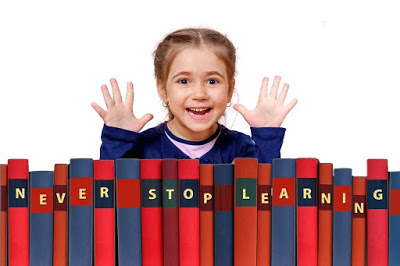California College of Early Childhood Education
Education Services (Schools, Tutors) in San Mateo, United States

California College of Early Childhood Education in a Nutshell
The primary mission of California College of Early Childhood Education is to instruct students to such competency levels that they are qualified for initial employment and/or career advancement in the Early Childhood Education field.
California College classes are suited for both aspiring teachers and teachers who want to advance their teaching careers. Our courses are taught by passionate, educated, qualified instructors with many years of field experience.
What our Customers Say About Us
Products / Services
Early Childhood Education Certificate
ECE Training Programs
ECE Certification Program
Online ECE Classes
On-Campus Classes
Explore our New Video
If you are the owner of this page login to add your video now! (Youtube/Vimeo/Daily Motion)
Read our Recent Articles
The Business of Knowledge: Why Lifelong Learning is the New Competitive Advantage
 In today's fast-paced and ever-changing world, the value of knowledge has never been higher. With industries evolving at lightning speed and new technologies disrupting traditional business models, the ability to adapt and learn continuously has become essential for success. In this blog post, we'll explore why lifelong learning is the new competitive advantage in the business world and how students can leverage this mindset to thrive in their academic and professional endeavors. Let’s dove right in!
In today's fast-paced and ever-changing world, the value of knowledge has never been higher. With industries evolving at lightning speed and new technologies disrupting traditional business models, the ability to adapt and learn continuously has become essential for success. In this blog post, we'll explore why lifelong learning is the new competitive advantage in the business world and how students can leverage this mindset to thrive in their academic and professional endeavors. Let’s dove right in!
How Do Early Childhood Educators Impact Children's Emotional Development?
 Research has shown that early childhood is the time when most of a child’s emotional and social development takes place. Every experience that a child goes through at this stage shapes and molds them into the adults that they will become. Temper tantrums are common among toddlers. This is the time they learn more about their own emotions.
Research has shown that early childhood is the time when most of a child’s emotional and social development takes place. Every experience that a child goes through at this stage shapes and molds them into the adults that they will become. Temper tantrums are common among toddlers. This is the time they learn more about their own emotions.
ECE Training and School Management
 The part of a school administrator is one of the most important roles in an educational institution, at any level, including early childhood education. Administrators are not only tasked with implementing the aims and objectives of the school and its policies but they also act as troubleshooters for the everyday issues that can crop up in a school.
The part of a school administrator is one of the most important roles in an educational institution, at any level, including early childhood education. Administrators are not only tasked with implementing the aims and objectives of the school and its policies but they also act as troubleshooters for the everyday issues that can crop up in a school.
Importance of Curriculum Planning in Education
 A curriculum is like a compass for your classroom. It sets the direction which has to be followed daily, weekly, monthly, and yearly as well. Teachers act as guides and the success of the classroom is dependent on the effectiveness of the curriculum. Your curriculum contains a series of planned activities and learning outcomes. It sets goals that have to be reached with regard to each subject. It works as a road map, outlining your path and the steps you need to take.
A curriculum is like a compass for your classroom. It sets the direction which has to be followed daily, weekly, monthly, and yearly as well. Teachers act as guides and the success of the classroom is dependent on the effectiveness of the curriculum. Your curriculum contains a series of planned activities and learning outcomes. It sets goals that have to be reached with regard to each subject. It works as a road map, outlining your path and the steps you need to take.
Early Childhood Education Program - What You Need to Know
 If you are a person who is passionate about working with children, you will enjoy a career in early childhood education. It is a growing field; the job outlook is good and the salary is high. To get a job in this field, there are certain qualifications that must be met. The qualifications required would depend on your state and its licensure requirements.
If you are a person who is passionate about working with children, you will enjoy a career in early childhood education. It is a growing field; the job outlook is good and the salary is high. To get a job in this field, there are certain qualifications that must be met. The qualifications required would depend on your state and its licensure requirements.
Making Possible Effective Career Advancement as an Educator
 Educators have the enormous responsibility of having to impart knowledge and to inspire. To do this effectively, they have to be up-to-date with current thoughts and ideas, advancements made in their areas and in the field of education. They need to constantly enhance their teaching, educational and leadership skills.
Educators have the enormous responsibility of having to impart knowledge and to inspire. To do this effectively, they have to be up-to-date with current thoughts and ideas, advancements made in their areas and in the field of education. They need to constantly enhance their teaching, educational and leadership skills.
Tips for Effective Online Learning
 Earlier, online education was a choice, but nowadays, it has become the norm. Online learning programs might sound easy, but in reality, virtual learning requires a higher level of commitment and organization. While studying from home, there is a tendency to slack off. The reason that people take up online courses is because they do not have the time to attend school as they could be working or studying or having other commitments.
Earlier, online education was a choice, but nowadays, it has become the norm. Online learning programs might sound easy, but in reality, virtual learning requires a higher level of commitment and organization. While studying from home, there is a tendency to slack off. The reason that people take up online courses is because they do not have the time to attend school as they could be working or studying or having other commitments.
Child Care Center Director - Qualification and Responsibilities
 In continuation with our series on the career opportunities available after getting an ECE certification, this article takes an overview at what a career as a childcare center director would entail. Any kind of educational institution requires an administrator. A child care director can act as the administrator for daycare centers, preschools and other types of child care centers.
In continuation with our series on the career opportunities available after getting an ECE certification, this article takes an overview at what a career as a childcare center director would entail. Any kind of educational institution requires an administrator. A child care director can act as the administrator for daycare centers, preschools and other types of child care centers.
What Are Your Career Options in the Early Education Field?
 In our last article, we took a look at some common career options for someone who has a certification in early childhood education. Let us now take an in-depth look at one of these options – that of a home-based child care provider. Many parents prefer to have a home-based care provider for their children.
In our last article, we took a look at some common career options for someone who has a certification in early childhood education. Let us now take an in-depth look at one of these options – that of a home-based child care provider. Many parents prefer to have a home-based care provider for their children.
Career Options After an Early Education Program
 An early education program makes a great stepping stone to a full-fledged career in education. Your career trajectory depends on what your end objective is and based on that, there are many options. Some people take up an early education program to help in educating and rearing their own children. But most people get an early education certificate to take up part time jobs in child care and education. For those who are looking for a long-term career in education, an early education program can be a step in the right direction.
An early education program makes a great stepping stone to a full-fledged career in education. Your career trajectory depends on what your end objective is and based on that, there are many options. Some people take up an early education program to help in educating and rearing their own children. But most people get an early education certificate to take up part time jobs in child care and education. For those who are looking for a long-term career in education, an early education program can be a step in the right direction.
Ways to Keep Your Little One Engaged at Home
 Even on a normal holiday, it is tough to keep children engaged at home. In these trying times, with both parents working from home, it is necessary to find activities for children which will keep them occupied without parents’ intervention. Here are some ways to keep your kids entertained and to stay sane!
Even on a normal holiday, it is tough to keep children engaged at home. In these trying times, with both parents working from home, it is necessary to find activities for children which will keep them occupied without parents’ intervention. Here are some ways to keep your kids entertained and to stay sane!
Why Is Social Development an Important Part of Early Education?
 Social development is the way people interact with one another. It is the way we develop our individuality as a person and as a part of the community. It refers to the skill set involved in communicating and sharing with the society. The ability to interact successfully with others is important to make us a well-adjusted part of society.
Social development is the way people interact with one another. It is the way we develop our individuality as a person and as a part of the community. It refers to the skill set involved in communicating and sharing with the society. The ability to interact successfully with others is important to make us a well-adjusted part of society.Advance Your Career with an Early Childhood Education Certification
 Working with children is a rewarding experience as any passionate educator will tell you. Early childhood is an amazing developmental period which can be challenging yet rewarding as the natural curiosity in children is piqued and can be harnessed to explore and learn. Children’s brains develop faster at this age than at any other point in their lives. The foundation for social skills, cognition, self-esteem, moral and mental outlook are established during these years.
Working with children is a rewarding experience as any passionate educator will tell you. Early childhood is an amazing developmental period which can be challenging yet rewarding as the natural curiosity in children is piqued and can be harnessed to explore and learn. Children’s brains develop faster at this age than at any other point in their lives. The foundation for social skills, cognition, self-esteem, moral and mental outlook are established during these years.
How to Make Your Students Listen to You
 Students in the age bracket of six to twelve years tend to have a very short attention span which can make it hard for you to hold their interest. Here are a few effective tips that will assist early childhood education teachers understand the psyche of young children and help them follow instructions.
Students in the age bracket of six to twelve years tend to have a very short attention span which can make it hard for you to hold their interest. Here are a few effective tips that will assist early childhood education teachers understand the psyche of young children and help them follow instructions.
Frequently Asked Questions about our Products / Services
What is early childhood education and its importance?
Early childhood education refers to the very first stage of formal learning a child encounters – preschool. This is where children learn basic social skills, how to work and exist with others and the basics of how to acquire knowledge. This is the foundation on which all future learning is based so its importance cannot be overemphasized. People who want to enter this highly rewarding and respected vocation need to have the proper qualifications in the form of having taken early childhood education courses. Doing this from a reputed institute that offers both online and classroom-based learning options is the best way to make a start on this career.
What is the importance of early learning for kids?
Early learning is not so much about absorbing knowledge, although that is important. The critical factor is enabling a child to develop and strengthen the learning and social skills upon which all future education and learning will be based. With the right preschool experience, a child will develop the confidence and acquire the skills needed to do well in the formal school and college learning that will come in the future. The qualification and abilities of the teachers play a critical role in the preschool experience. I did a lot of research on this to find the right early learning in San Mateo for my child.
What qualifications do you need for early childhood education?
The starting point is an Early Childhood Education Certificate. With this, you can apply for jobs and once you start working, look a various advanced qualifications available to find one that works for you. The quality of the teaching you get in the initial stages will not only determine your grades, but also how well equipped you are to start your career. That is why enrolling at a reputed institute that offers a both online and classroom based early learning course is the best option.
How do you build a career in early childhood education?
The basis of a successful career in early childhood education is having the right qualifications. You can get this by enrolling in a college that offers these courses. Choose for classroom-based or online learning, as you prefer. With the end of the pandemic in sight, jobs will be opening up soon. Even now, there is work available.
What are the current trends in early childhood education?
There are a few different trends in early childhood education that are popular right now. One trend is to focus on STEAM (Science, Technology, Engineering, Arts and Math) education. This trend focuses on helping children learn about these subjects in a fun and interactive way. Another trend is to focus on teaching children social and emotional skills. This involves teaching children how to regulate their emotions, cooperate with others, and communicate effectively. Lastly, there is a trend towards using more technology in the classroom.
What's the best way to learn about early childhood education?
The best way to learn about early childhood education is by taking ECE classes in California. The ECE classes offered in California are comprehensive and cover a variety of topics related to early childhood education. They will give you the skills and knowledge you need to work with young children and help them develop their cognitive, social, and emotional skills. If you're interested in pursuing a career in early childhood education, then the ECE classes offered in California are definitely the best way to go.
What are the benefits of being an early childhood educator?
There are many benefits to being an early childhood educator. One of the most important benefits is the opportunity to help shape young minds. As an early childhood educator, you have the chance to introduce children to new concepts and help them develop important skills. Another benefit is the opportunity to build strong relationships with families. As an early childhood educator, you will be one of the first people that parents entrust their child’s care and development too. This can be a very rewarding experience. Finally, being an early childhood educator can be personally fulfilling. Knowing that you are playing a role in a child’s growth and development can be very satisfying.
What are the basic concepts of early childhood education?
1. The first concept is that early childhood education is important for a child's cognitive, social-emotional, and physical development.
2. The second concept is that early childhood education should be fun and enjoyable for the child.
3. The third concept is that early childhood education should be developmentally appropriate.
4. The fourth concept is that early childhood education should help prepare children for kindergarten and later schooling.
5. The fifth concept is that early childhood educators should have training in child development and in how to teach young children.
6. The sixth and last concept is that parents are their children's first teachers, and should be involved in their children's early education whenever possible.
What Careers Can I have with an Early Childhood Education?
There are a number of different careers that you can have with an Early Childhood Education. These include working as a preschool teacher, working in a daycare center, or even as a nanny. Each of these options has its own set of benefits and drawbacks, so it's important to carefully consider what type of position would be right for you.
In general, early childhood educators play an important role in the lives of young children. They help to shape their social, emotional, and cognitive skills during a crucial period in their development. Early childhood educators also work to create positive learning environments for kids and help them develop healthy habits and routines.
Why is creativity important in early childhood education?
Creativity is important in early childhood education for a number of reasons. First, it helps children develop their own unique identity and voice. Second, creativity allows children to explore the world around them and make sense of their place in it. Third, creativity fosters critical thinking and problem-solving skills. And finally, creativity is simply fun! It's a great way for children to express themselves and engage with their peers.
What is the objective of early childhood education?
The objective of early childhood education is to provide children with the foundation they need to be successful students in elementary school and beyond. This includes teaching them how to read, write, and do the math, of course, but also helping them develop social and emotional skills, such as cooperation, self-control, and empathy.
It's important for young children to get a good start in school so that they can continue learning and growing at a healthy pace. That's why early childhood education is so important - it sets the stage for success in later years.
Where can I will get online ECE classes in San Mateo?
There are a few different places you can take online ECE classes in San Mateo. One option is to check with your local community college. Another option is to check with an online school like California College of ECE. Finally, you could also check with a program like the ones offered by Teachers College, Columbia University, or Harvard Extension School. Whichever route you choose, be sure to do your research and compare programs to find the one that best meets your needs.
Why is ece so important?
ECE classes can provide students with the fundamental knowledge and skills necessary for a successful career in engineering. In addition, ECE courses can help students develop problem-solving, critical thinking, and teamwork skills.
What is ECE Certification Program in California?
In California, the Early Childhood Education (ECE) Certification Program is a program that certifies early childhood educators to work in child care centers and preschools. The program is administered by the California Commission on Teacher Credentialing (CTC) and has different levels of certification, including the Child Development Teacher Permit and the Site Supervisor Permit. To be eligible for certification, candidates must have a certain level of education, such as an associate or bachelor's degree in early childhood education or a related field, and pass a competency examination. ECE Certification Programs in California also require ongoing professional development to maintain certification. These programs are designed to ensure that early childhood educators in California possess the knowledge and skills necessary to provide high-quality care and education to young children.
What is the scope after Early Childhood Education?
Early Childhood Education (ECE) is a growing field with a wide range of opportunities for those with the appropriate education and training. Some of the most common career paths in ECE include working as a preschool or kindergarten teacher, childcare center director, family child care provider, early intervention specialist, curriculum developer, or parent educator.
As the demand for high-quality early childhood education continues to increase, there are also opportunities for advancement into leadership and management roles within organizations. Additionally, those with an ECE background may pursue advanced degrees in related fields such as child development, education, psychology, or social work.
ECE professionals can also choose to work in a variety of settings, including public and private schools, childcare centers, non-profit organizations, or government agencies. With a degree in early childhood education, individuals have the potential to make a positive impact on the lives of young children and families while pursuing fulfilling and rewarding careers.
What are the benefits of studying early childhood education?
Studying Early Childhood Education (ECE) can lead to a variety of benefits, both personally and professionally. Here are some potential benefits of pursuing ECE certification programs:
Professional growth: ECE certification programs provide the opportunity to expand your knowledge and skills in early childhood education, allowing you to grow as a professional and better support children's learning and development.
Career opportunities: ECE certification programs can open doors to a variety of career opportunities, such as working in child care centers, preschools, public schools, or other educational settings.
Fulfilling work: Many people find working with young children to be rewarding and fulfilling. ECE certification programs can provide the skills and knowledge needed to make a positive impact on children's lives.
Positive impact on communities: By working in early childhood education, you can make a positive impact on your community by helping to shape the next generation of learners.
A better understanding of child development: ECE certification programs provide a comprehensive understanding of child development, which can be applied to a variety of settings and situations, both personal and professional.
Overall, pursuing ECE certification programs can lead to personal and professional growth, fulfilling work, and the opportunity to make a positive impact on communities and children's lives.
How does early childhood education help kids?
Early childhood education (ECE) provides a foundation for children's academic and social success later in life. ECE focuses on the development of children from birth to age 8, which is a critical period for brain development and learning.
Here are some ways that ECE can help kids:
School readiness: ECE programs can help children develop the skills and knowledge needed for success in school, such as early literacy and math skills, problem-solving abilities, and social-emotional skills.
Cognitive development: ECE can promote cognitive development, including critical thinking, creativity, and problem-solving abilities.
Social-emotional development: ECE can help children develop positive social-emotional skills, such as self-awareness, self-regulation, empathy, and interpersonal communication skills.
Health and well-being: ECE can support children's physical health and well-being through nutrition education, physical activity, and health screenings.
Parental involvement: ECE can provide opportunities for parents to be involved in their child's education and support their child's learning and development.
Overall, ECE can have a positive impact on children's development and readiness for school, leading to long-term academic and social success. Pursuing an Early Childhood Education Certificate can help individuals gain the skills and knowledge needed to support children's learning and development in ECE settings.
Can I earn a degree or certification in early childhood education completely online?
Yes, it is possible to earn a degree or certification in early childhood education (ECE) completely online. Many colleges and universities now offer online ECE degree and certificate programs, providing students with the flexibility to complete coursework on their own schedule from anywhere with an internet connection.
Online ECE programs typically cover the same material as their on-campus counterparts and require students to complete assignments, exams, and other coursework online. Some programs also require students to complete in-person practicum experiences or student teaching requirements.
To ensure the quality of the education received, it is important to choose an online ECE program that is accredited by a recognized accrediting body. The National Association for the Education of Young Children (NAEYC) is one such accrediting body that evaluates ECE programs for quality and adherence to industry standards.
Obtaining an ECE certificate or degree can open doors to a variety of careers, such as preschool teacher, childcare center director, or curriculum developer.
What is early childhood development course?
An early childhood development course is a program of study that focuses on the growth and development of children from birth to age eight. These courses provide students with a comprehensive understanding of the physical, cognitive, social, and emotional development of young children. Students learn about various theories and approaches related to early childhood development and gain practical skills in observation, assessment, and interaction with young children. The curriculum typically covers topics such as child psychology, child health and nutrition, early literacy, play-based learning, and inclusive education. Early childhood development courses are designed for individuals who are interested in working with young children in various settings, including preschools, daycare centers, and early intervention programs.
What are some of the most popular online early childhood courses?
There are several popular online early childhood courses that provide quality education and training. Some notable ones include:
1. "Introduction to Early Childhood Development" by Coursera: A comprehensive course covering various aspects of child development and early education.
2. "Early Childhood Education Certificate" by Penn Foster: A program focusing on the fundamentals of early childhood education and practical teaching strategies.
3. "Childhood Trauma and Resilience" by edX: Explores the impact of trauma on child development and strategies for promoting resilience.
4. "Teaching Preschool: A Year of Inspiring Lessons" by Udemy: Offers practical insights, lesson plans, and techniques for teaching preschool-aged children.
5. "Foundations of Early Childhood Education" by FutureLearn: Covers key theories, practices, and policies in early childhood education.
6. "Montessori Teacher Training" by International Montessori Institute: Provides specialized training in the Montessori method and its application in early childhood settings.
These courses, among others, offer flexibility, accessibility, and the opportunity to gain knowledge and skills in early childhood education through online platforms. It's important to research and choose courses that align with individual learning goals and requirements.
What skills and knowledge can be gained through an early childhood education degree?
An early childhood education degree equips individuals with a comprehensive skill set and knowledge base to work effectively with young children. Graduates gain expertise in child development theories, curriculum design, and age-appropriate teaching methods. They learn to create nurturing and inclusive environments that foster social, emotional, cognitive, and physical development. Additionally, they acquire communication and collaboration skills for engaging with parents, caregivers, and colleagues. The degree program covers topics like early literacy, math concepts, and cultural diversity to support diverse learners. Practical experiences, such as student teaching, enhance their classroom management, observation, and assessment abilities, preparing them for fulfilling careers in preschools, elementary schools, or childcare centers.
How do early childhood education programs contribute to a child's cognitive and social development?
Early childhood education programs play a pivotal role in cognitive and social development. Structured activities stimulate cognitive skills like language, problem-solving, and creativity. Socially, interactions with peers and teachers enhance communication, teamwork, and empathy. Play-based learning hones motor skills, while group activities foster sharing and cooperation. Well-designed curricula build a strong foundation for future academic achievements, preparing children to grasp complex concepts. Moreover, exposure to diverse backgrounds encourages tolerance and cultural awareness. By nurturing cognitive abilities and shaping social behavior, early childhood education programs pave the way for holistic development, equipping children with essential skills for lifelong success.
Are there any specialized areas or concentrations within early childhood development that students can focus on during their studies?
Yes, within an early childhood development degree, students often have opportunities to specialize in specific areas or concentrations. These specializations allow students to tailor their education to particular interests or career goals. Some common concentrations include:
1. Early Childhood Education: Focusing on pedagogy, curriculum development, and teaching techniques for young children, this concentration prepares students for roles as educators in preschools and kindergartens.
2. Child Life Specialist: This specialization equips students to work in healthcare settings, helping children and families cope with illness or hospitalization.
3. Special Education: Students can focus on working with children with disabilities or special needs, preparing them to be advocates and educators in inclusive or special education settings.
4. Family Support and Social Work: Concentrating on family dynamics, this specialization is valuable for those interested in social work, family support, or counseling for young children and their families.
5. Child Development Research: Preparing students for careers in research and policy development related to early childhood development and education.
These concentrations offer students a deeper understanding of specific aspects within the broad field of early childhood development, allowing them to pursue diverse career paths tailored to their interests and passions.
How do your child development courses integrate both theoretical knowledge and practical applications in real-world settings?
Our child development courses blend theoretical concepts with practical applications by employing various methods. Students engage in case studies, simulations, and hands-on experiences, observing real-world scenarios in childcare settings. They apply theories practically, creating lesson plans, conducting observations, and interacting with children. Fieldwork, internships, and practicums further bridge theory to practice, allowing students to apply knowledge in real settings, ensuring a comprehensive understanding of child development's practical implications. This integration cultivates skills essential for effective work in diverse professional environments involving children.
What are child development classes, and what topics do they typically cover?
Child development courses delve into understanding how children grow physically, emotionally, socially, and cognitively. Topics often covered include:
1. Developmental Milestones: Recognizing stages in a child's growth and what to expect at various ages.
2. Cognitive Development: Understanding how children learn, think, problem-solve, and reason as they age.
3. Social and Emotional Development: Exploring how children form relationships, manage emotions, and develop empathy.
4. Physical Development: Understanding motor skills, physical changes, and health considerations.
5. Language Development: Studying how children acquire language skills and communicate at different ages.
6. Parenting and Caregiving Techniques: Learning effective strategies to nurture, discipline, and support children.
7. Education and Play: Exploring the importance of play in learning and educational approaches for early childhood.
8. Cultural and Environmental Influences: Understanding how culture, family dynamics, and environments impact child development.
These classes help individuals working with or caring for children gain insights into their needs, behaviors, and growth, providing tools to support healthy development.
What is a Child Care Provider Practicum?
A Child Care Provider Practicum typically refers to a hands-on, practical learning experience in the field of child care. It is a supervised placement or internship where individuals, often students pursuing a degree or certification in early childhood education or a related field, gain practical experience by working in a real-world child care setting. The practicum allows students to apply theoretical knowledge gained in the classroom to practical situations, enhance their skills, and develop a deeper understanding of working with children.
During a Child Care Provider Practicum, participants may engage in various activities, including:
1. Direct Interaction with Children: Hands-on experience in caring for and interacting with children of different age groups.
2. Lesson Planning: Designing and implementing age-appropriate activities and lesson plans.
3. Observation: Actively observing and assessing children's behavior, development, and learning.
4. Collaboration with Professionals: Working alongside experienced child care professionals and educators to understand best practices.
5. Parent Communication: Learning effective communication with parents or guardians regarding the child's progress, behavior, and development.
6. Health and Safety Procedures: Implementing health and safety protocols relevant to child care settings.
7. Documentation: Keeping records, writing reports, and maintaining documentation related to child development and activities.
8. Reflective Practice: Reflecting on experiences, challenges, and successes to enhance professional growth.
Child Care Provider Practicums are valuable components of educational programs in early childhood education or related fields, providing a bridge between academic learning and practical application. They offer aspiring child care providers the opportunity to gain hands-on experience, develop practical skills, and become familiar with the day-to-day responsibilities of working in a child care environment.
What are the key responsibilities and duties of someone in a Child Care Center Supervision & Administration role?
A Child Care Center Supervisor or Administrator plays a critical role in ensuring the smooth operation and quality of care provided within the facility. Their key responsibilities and duties include:
1. Staff Management: Supervising and managing childcare staff, including hiring, training, scheduling, and performance evaluation to ensure compliance with regulations and maintain high-quality care standards.
2. Curriculum Oversight: Developing, implementing, and monitoring age-appropriate curricula and educational programs that promote child development and learning outcomes.
3. Regulatory Compliance: Ensuring adherence to licensing requirements, safety regulations, and childcare standards set by relevant authorities, including maintaining accurate records and documentation.
4. Parent Communication: Facilitating effective communication with parents or guardians regarding their child's progress, development, and any concerns, as well as addressing parental inquiries and feedback.
5. Budget Management: Overseeing the center's budget, including financial planning, expenditure control, and resource allocation to sustain operations and meet program needs effectively.
6. Facility Operations: Managing the day-to-day operations of the childcare center, including facility maintenance, equipment procurement, and ensuring a safe and conducive environment for children.
7. Community Engagement: Building positive relationships with the community, networking with local organizations, and participating in outreach activities to promote the center and foster partnerships for support and resources.
8. Conflict Resolution: Handling conflicts or issues that may arise among staff, parents, or children in a professional and constructive manner, striving to maintain a harmonious and inclusive environment.
9. Continuous Improvement: Monitoring and evaluating the quality of childcare services provided, identifying areas for improvement, and implementing strategies to enhance program effectiveness and meet evolving needs.
10. Emergency Preparedness: Developing and implementing emergency protocols and procedures to ensure the safety and well-being of children and staff in the event of accidents, natural disasters, or other emergencies.
Overall, a Child Care Center Supervisor or Administrator plays a multifaceted role in overseeing all aspects of childcare operations, from personnel management to program development, with the overarching goal of providing high-quality care and support for children's growth and development.
What is the definition of supervision in childcare?
In the realm of Child Care Center Supervision & Administration, supervision in childcare refers to the systematic oversight and guidance provided by trained caregivers or administrators to ensure the safety, well-being, and developmental needs of children under their care. It encompasses continuous monitoring of children's activities, interactions, and environments to mitigate potential risks and promote positive outcomes.
Effective supervision involves maintaining appropriate adult-to-child ratios, actively engaging with children during play and learning activities, and preemptively addressing any emerging concerns or conflicts. Supervisors also play a crucial role in implementing and upholding safety protocols, including emergency procedures and health standards, to create a secure environment for children.
Furthermore, supervision extends beyond physical safety to encompass emotional and social support, fostering nurturing relationships between caregivers and children. Through attentive supervision, Child Care Center Supervision & Administration ensures that childcare settings facilitate optimal growth, learning, and well-being for every child in their care.
What is the difference between an early childhood educator degree and a teaching degree?
An Early Childhood Educator Degree and a Teaching Degree differ primarily in their focus and scope of study. A degree in Early Childhood Education specifically prepares individuals to work with young children from birth to around age eight in various early childhood settings, such as preschools, daycare centers, and early intervention programs. It emphasizes child development, curriculum design, and creating nurturing learning environments tailored to the needs of young children.
On the other hand, a Teaching Degree typically encompasses broader education and pedagogy concepts and prepares individuals to work as educators in primary or secondary school settings. It may include coursework in curriculum development, classroom management, subject-specific instruction, and educational psychology, catering to a wider age range of students.
While both degrees involve teaching, the Early Childhood Educator Degree focuses specifically on the unique needs and developmental stages of young children, while a Teaching Degree encompasses a broader educational spectrum.
How do online ECE units compare to traditional in-person courses in terms of quality and effectiveness?
Online ECE Units offer flexibility and accessibility, allowing students to balance their studies with other commitments. However, the quality and effectiveness of online courses compared to traditional in-person courses depend on various factors. While online courses often provide well-structured content and interactive resources, they may lack the face-to-face interaction and hands-on experience crucial for some aspects of early childhood education.
In-person courses typically offer immediate feedback from instructors and opportunities for collaborative learning, which can enhance comprehension and skill development. Additionally, the physical classroom environment may better facilitate practical activities and observation-based learning experiences integral to ECE.
Nevertheless, the quality of online ECE Units can be comparable to traditional courses when designed with engaging multimedia, interactive discussions, and opportunities for virtual collaboration. Successful online learning also requires self-discipline, time management, and proactive communication with instructors to ensure understanding and engagement with course materials.
How do I choose the best ECE program for my child?
Choosing the best Early Childhood Education (ECE) program for your child involves careful consideration of several factors. Begin by researching programs in your area and assessing their reputation, accreditation status, and curriculum. Look for programs that emphasize a balance between play-based learning and structured activities to foster holistic development.
Visit potential ECE programs to observe the environment and interact with staff. Pay attention to the quality of interactions between teachers and children, as well as the safety and cleanliness of the facilities. Inquire about teacher qualifications, staff turnover rates, and the teacher-to-child ratio, which can significantly impact your child's experience and development.
Consider your child's individual needs, interests, and temperament when evaluating programs. A good fit should align with your family's values and goals for early education. Additionally, seek recommendations from other parents and consider reading reviews or testimonials to gain insights into the experiences of families who have enrolled their children in the program. Taking these steps will help you make an informed decision that supports your child's early learning and growth.
What are the benefits of having an early childhood educator certificate?
Having an Early Childhood Educator Certificate offers numerous benefits for individuals dedicated to working with young children. This certification validates your expertise and skills in early childhood education, setting you apart as a qualified professional in a competitive job market. With an Early Childhood Educator Certificate, you are recognized for your specialized knowledge in child development, effective teaching strategies, and creating nurturing learning environments, which can lead to enhanced job prospects and career advancement.
The certificate also opens doors to higher-paying positions and more stable employment opportunities. Employers, including schools, daycare centers, and educational programs, often prefer or require certified educators, knowing they meet stringent standards of quality and competency. Additionally, holding this certificate can provide greater job satisfaction, as you are better equipped to make a meaningful impact on children's lives during their formative years. It also offers opportunities for ongoing professional development, ensuring you stay current with best practices and emerging trends in early childhood education.
What are the benefits of taking early childhood education courses?
Taking Early Childhood Education courses offers several key benefits for those pursuing a career in teaching young children. These courses provide a deep understanding of child development, enabling educators to tailor their approaches to meet the unique needs of each child. By learning about developmental milestones, educators can better support cognitive, social, and emotional growth.
Early childhood education courses also equip professionals with effective teaching strategies and classroom management techniques, helping them create engaging and supportive learning environments. Practical components of these courses, such as hands-on activities and observations, allow students to apply theoretical knowledge in real-world settings, enhancing their practical skills.
Additionally, completing these courses can lead to certifications and qualifications that are often required for employment in the field. This not only improves job prospects but also opens doors for career advancement and specialization. Overall, these courses are essential for developing the expertise needed to positively impact young learners’ educational experiences.
How do online ECE programs compare to traditional in-person programs?
Online early childhood education (ECE) programs offer distinct advantages compared to traditional in-person programs, though both have their strengths. One major benefit of an ECE program online is flexibility. Students can study at their own pace, fitting coursework around their schedules, which is particularly valuable for working professionals or parents. Online programs also provide access to a wide range of resources, allowing students to engage with material from anywhere.
However, traditional in-person ECE programs offer hands-on experiences, which are crucial for early childhood educators. Being in a physical classroom allows students to interact directly with children, observe developmental stages, and apply theories in real-time, which can be harder to replicate in an online setting.
Despite this, many ECE program online options now incorporate virtual classrooms, simulations, and interactive modules, bridging the gap between theory and practice. Ultimately, the choice depends on individual preferences, learning styles, and career goals, as both online and in-person programs provide valuable education.
What is special needs education in early childhood?
Special Needs Education in Early Childhood focuses on providing individualized support and interventions for young children with developmental delays, disabilities, or learning difficulties. These tailored educational programs are designed to address a wide range of needs, from physical and sensory impairments to cognitive and emotional challenges. By offering specialized services, such as speech therapy, occupational therapy, and adaptive learning techniques, special needs education helps children build foundational skills critical to their long-term development.
Early identification and intervention are key components of Special Needs Education in Early Childhood. When challenges are addressed early, children are better equipped to thrive in both academic and social environments. This inclusive approach not only supports the child's learning but also fosters positive interactions with peers and teachers. By creating a nurturing, adaptive learning environment, special needs education ensures that each child has the opportunity to reach their full potential, laying the groundwork for future success in life and education.
Why is child psychology important for educators?
Child psychology is crucial for educators because it provides insight into how children think, learn, and develop emotionally. Understanding the cognitive and emotional stages children go through helps educators create effective learning environments tailored to each child's needs. Child Psychology for Educators equips teachers with knowledge about typical and atypical development, enabling them to identify early signs of learning difficulties or behavioral challenges.
By applying child psychology principles, educators can adjust their teaching strategies to enhance student engagement, motivation, and social interaction. This understanding helps foster a supportive and nurturing classroom atmosphere, where children feel safe and valued, ultimately boosting their academic success and emotional well-being. Additionally, knowledge of child psychology allows educators to respond appropriately to disruptive behavior, manage classroom dynamics, and create individualized learning plans. Overall, child psychology helps educators guide children in their personal and academic development, ensuring a more inclusive and effective educational experience.
Why is training important for daycare teachers?
Training is crucial for daycare teachers as it equips them with the knowledge and skills needed to provide high-quality care and education to young children. Daycare Teacher Training ensures that teachers understand child development, behavior management, and the importance of creating a safe, nurturing environment. Well-trained teachers can design age-appropriate learning activities that promote cognitive, social, and emotional growth, fostering a positive early childhood experience.
Additionally, Daycare Teacher Training teaches teachers how to handle emergencies, manage classroom dynamics, and communicate effectively with parents, ensuring both the safety and well-being of children. It also helps them understand legal and ethical responsibilities, including child protection regulations and health guidelines.
Proper training enhances job performance and boosts teacher confidence, ultimately benefiting children, families, and the daycare center. It ensures that teachers are prepared to meet the needs of each child, contributing to their overall development and well-being.
What are the key stages of development in infants and toddlers?
Infant/Toddler Development studies identify several key stages in the growth of infants and toddlers, each marked by significant cognitive, emotional, and physical milestones. The first stage, from birth to 2 months, focuses on sensory development, with infants learning to recognize voices and faces. They begin to develop motor skills, such as lifting their heads and tracking objects with their eyes.
From 3 to 6 months, infants improve their hand-eye coordination, start babbling, and show stronger emotional responses. By 7 to 12 months, they begin to crawl, stand, and explore their environment. Cognitive development accelerates, and they start understanding object permanence.
Between 1 and 2 years, toddlers become more independent, walking and speaking in short sentences. They also start to engage in simple pretend play, showing early problem-solving abilities. The final stage, from 2 to 3 years, marks rapid language development and social skills, with toddlers expressing more emotions and forming relationships.
These stages in Infant/Toddler Development studies offer essential insights into early childhood growth.
What are the most common disabilities addressed in early childhood special education?
Special Needs Education in Early Childhood addresses various developmental and learning disabilities to support young children in their early years. One of the most common disabilities is autism spectrum disorder (ASD), which affects communication, social skills, and behavior. Early intervention helps children with ASD develop language, interaction, and adaptive skills.
Another prevalent condition is speech and language disorders, where children may struggle with articulation, comprehension, or verbal expression. Speech therapy plays a crucial role in improving communication abilities. Additionally, developmental delays in motor skills, cognitive functions, or emotional regulation are frequently addressed through specialized learning techniques.
Intellectual disabilities, attention-deficit/hyperactivity disorder (ADHD), and sensory processing disorders also require tailored support. Children with ADHD benefit from structured routines and behavioral strategies, while those with sensory challenges need adaptive environments. Special Needs Education in Early Childhood focuses on individualized learning plans, ensuring each child receives the necessary support for their unique developmental needs.
How can understanding child psychology improve teaching strategies?
Understanding Child Psychology for Educators allows teachers to develop more effective teaching strategies by recognizing how children learn, process information, and respond to different stimuli. By studying child psychology, educators can tailor their instructional methods to match students' cognitive and emotional development, ensuring lessons are engaging and age-appropriate.
One of the key benefits of Child Psychology for Educators is the ability to identify diverse learning styles. Some students excel with visual aids, while others respond better to hands-on activities or verbal instruction. By applying psychological insights, teachers can adapt their approach to meet each student's unique needs, leading to better comprehension and retention of information.
Additionally, understanding child psychology helps educators manage classroom behavior effectively. Recognizing the underlying reasons for behavioral challenges allows teachers to implement positive reinforcement strategies and create a supportive learning environment. This not only improves academic performance but also fosters emotional well-being and social development among students.
What is the purpose of the Early Child Care Provider Practicum?
The purpose of the Early Child Care Provider Practicum is to provide hands-on experience in a real childcare setting. It allows participants to apply theoretical knowledge, develop caregiving skills, and understand child development stages while working under supervision. This practicum prepares individuals for a professional career in early childhood education.
What qualifications do I need before starting the practicum?
Before starting an Early Child Care Provider Practicum, certain qualifications and prerequisites are typically required. First, most programs require participants to have a high school diploma or equivalent. This foundational education is necessary to ensure that candidates have basic literacy and numeracy skills. In addition, many practicum programs recommend or require a background in early childhood education, which can be obtained through a formal certificate or associate degree program.
Candidates are often expected to complete basic child development coursework to understand the stages of child growth, learning, and behavior management. Some programs may also require proof of first aid and CPR certification to ensure safety during childcare activities.
Lastly, background checks, including criminal record screenings, are commonly required to ensure the safety and well-being of children in care settings. These qualifications help prepare individuals for an enriching and professional Early Child Care Provider Practicum experience.
Why are early development studies important for infants and toddlers?
Early development studies are crucial because the first few years of life are when the brain grows most rapidly, laying the foundation for a child’s future learning, behavior, and health. Infant/Toddler Development studies help us understand how young children grow physically, emotionally, socially, and cognitively. These insights guide parents, caregivers, and educators in creating nurturing environments that support optimal development. For example, studies have shown that consistent caregiver interaction—like talking, cuddling, and playing—can significantly boost brain development and emotional security. They also highlight the importance of early detection and intervention for developmental delays, which can improve long-term outcomes. By understanding how infants and toddlers learn through sensory exploration, routine, and responsive relationships, caregivers can provide more intentional support. In short, early development studies are not just academic—they are powerful tools that help give every child the best possible start in life by turning research into real-world nurturing practices.
 A significant milestone in the life of a child is the beginning of their schooling. There is a feeling of apprehension mixed with excitement. For a lot of children, it is their first time being away from their parents. This is also a time when they will learn new things.
A significant milestone in the life of a child is the beginning of their schooling. There is a feeling of apprehension mixed with excitement. For a lot of children, it is their first time being away from their parents. This is also a time when they will learn new things.